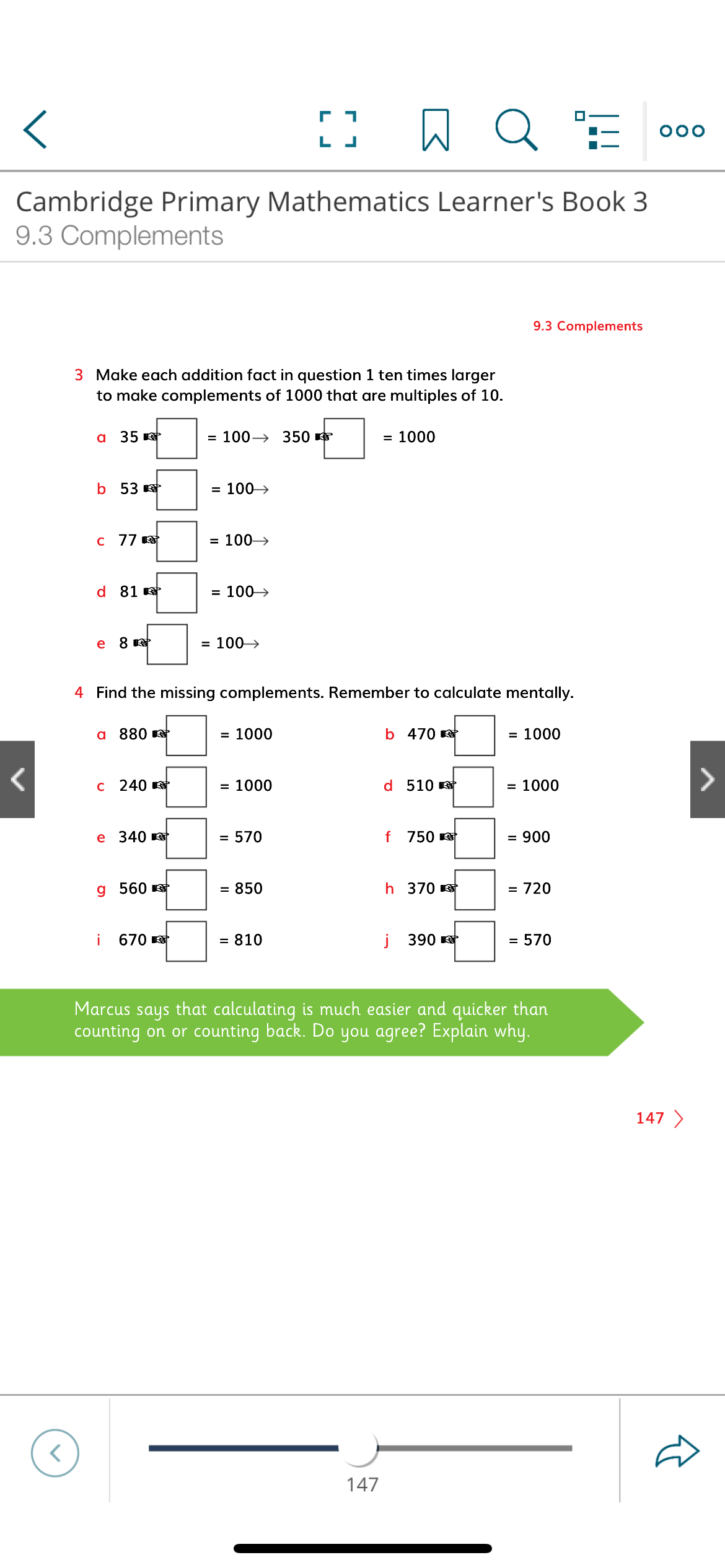Make each addition fact in question 1 ten times larger to make complements of 1000 that are multiples of 10. Find the missing complements. Remember to calculate mentally. Marcus sa... Make each addition fact in question 1 ten times larger to make complements of 1000 that are multiples of 10. Find the missing complements. Remember to calculate mentally. Marcus says that calculating is much easier and quicker than counting on or counting back. Do you agree? Explain why.

Understand the Problem
The question is asking to find the complements of certain numbers to 1000 and to complete addition facts by making them ten times larger. Additionally, it asks for an opinion on whether calculating is easier than counting on or back.
Answer
The answers are: 3. a: \( 350 \), b: \( 530 \), c: \( 770 \), d: \( 810 \), e: \( 80 \) 4. a: \( 120 \), b: \( 530 \), c: \( 760 \), d: \( 490 \), e: \( 230 \), f: \( 150 \), g: \( 290 \), h: \( 350 \), i: \( 140 \), j: \( 180 \)
Answer for screen readers
The completed answers are as follows:
- a: ( 350 + 650 = 1000 )
- b: ( 530 + 470 = 1000 )
- c: ( 770 + 230 = 1000 )
- d: ( 810 + 190 = 1000 )
- e: ( 80 + 920 = 1000 )
- a: ( 120 )
- b: ( 530 )
- c: ( 760 )
- d: ( 490 )
- e: ( 230 )
- f: ( 150 )
- g: ( 290 )
- h: ( 350 )
- i: ( 140 )
- j: ( 180 )
Steps to Solve
- Scaling the Addition Facts
To make each addition fact ten times larger, we multiply each number by 10.
- For ( a: 35 \times 10 = 350 )
Thus, ( 350 + 650 = 1000 )
- For ( b: 53 \times 10 = 530 )
Thus, ( 530 + 470 = 1000 )
- For ( c: 77 \times 10 = 770 )
Thus, ( 770 + 230 = 1000 )
- For ( d: 81 \times 10 = 810 )
Thus, ( 810 + 190 = 1000 )
- For ( e: 8 \times 10 = 80 )
Thus, ( 80 + 920 = 1000 )
- Finding Complements for Completeness
Next, we calculate the complements for each of the given numbers to reach 1000.
-
For ( a: 1000 - 880 = 120 )
-
For ( b: 1000 - 470 = 530 )
-
For ( c: 1000 - 240 = 760 )
-
For ( d: 1000 - 510 = 490 )
-
For ( e: 570 - 340 = 230 )
-
For ( f: 900 - 750 = 150 )
-
For ( g: 850 - 560 = 290 )
-
For ( h: 720 - 370 = 350 )
-
For ( i: 810 - 670 = 140 )
-
For ( j: 570 - 390 = 180 )
The completed answers are as follows:
- a: ( 350 + 650 = 1000 )
- b: ( 530 + 470 = 1000 )
- c: ( 770 + 230 = 1000 )
- d: ( 810 + 190 = 1000 )
- e: ( 80 + 920 = 1000 )
- a: ( 120 )
- b: ( 530 )
- c: ( 760 )
- d: ( 490 )
- e: ( 230 )
- f: ( 150 )
- g: ( 290 )
- h: ( 350 )
- i: ( 140 )
- j: ( 180 )
More Information
This exercise reinforces the concept of complements, where you find the number needed to reach a sum of 1000. It also highlights the relationship between base values and their multiples.
Tips
- Forgetting to multiply by 10 when scaling the addition facts.
- Confusing complements as additions rather than subtractions.
AI-generated content may contain errors. Please verify critical information